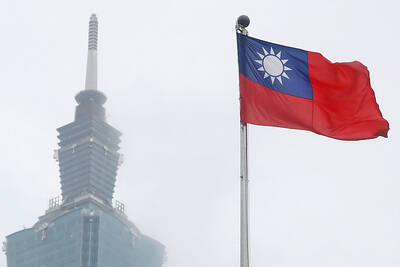The US dollar dived to a fresh record low against the euro on Friday as foreign exchange speculators appeared to shrug off an upbeat economic report that revealed a surprisingly strong surge in US job creation.
The already ailing US dollar tumbled to a fresh low point against the euro in Friday afternoon trading as traders continued to fret about US economic prospects amid a housing slump and credit woes.
The euro was switching hands at US$1.4504 in afternoon trading, up from US$1.4422 late on Thursday. The euro, however, had surged to a record US$1.4528 in earlier trading on Friday.
The US dollar gained some ground against the yen, rising to ?114.65 in afternoon deals, compared with ?114.54 a day earlier.
But the dollar fell against other currencies including the British pound and Canadian dollar, continuing a months-long decline.
The greenback fell despite a government report showing US employment growth accelerated last month as 166,000 new jobs were created. The survey suggested the US economy is weathering housing and credit woes.
The British currency rose to US$2.0888 at 7:05pm GMT from US$2.0793 on Thursday.
The Canadian dollar meanwhile spiked nearly two percent to a record high of US$1.0723.
In afternoon trading, the dollar was at 1.1529 Swiss francs, down from SF1.1575 a day earlier.
Asian currencies pared gains made earlier in the week as investors reduced holdings of emerging-market assets on speculation subprime-mortgage losses will hinder global economic growth.
Malaysia's ringgit snapped two days of gains on Friday and South Korea's won declined for a second day after ratings cuts on Citigroup Inc and Bank of America Corp increased concern credit-market losses will erode earnings of US banks. Five of the 10 most active currencies in Asia closed the week higher, the won was little changed and four declined.
The ringgit closed the week 0.1 percent higher at 3.3430 against the US dollar, after a 0.4 percent decline on Friday, data compiled by Bloomberg show. That was its eighth weekly gain.
The won ended the week little changed after falling as much as 0.6 percent on Friday to 909.00 before closing at 907.10, Seoul Money Brokerage Services Ltd said.
The Morgan Stanley Capital International Asia-Pacific Index dropped 1.6 percent on Friday after analysts at CIBC World Markets said investors should sell shares of Citigroup, the largest US bank, because the company may not be able to pay its dividend unless it sells assets.
The South Korean won declined the most in three weeks against the US dollar as the benchmark KOSPI index of shares slid as much as 2.4 percent.
The New Taiwan dollar was little changed against the US currency at NT$32.390, Taipei Forex Inc said.
Indonesia's rupiah fell 0.1 percent to 9,133 per US dollar in the week as investors sold emerging market assets. Record crude oil prices may also spur demand for US dollars among importers, said Masahiro Gao at PT Bank Mizuho Indonesia.
Singapore's dollar was little changed in the week at S$1.4501, and Thailand's baht gained 0.3 percent to 34 in onshore trading.
Financial markets in the Philippines were closed for a public holiday.

AI SPLURGE: The four major US tech companies have lost more than US$950 billion in value since releasing earnings and outlooks, while equipment makers were gaining Four of the biggest US technology companies together have forecast capital expenditures that would reach about US$650 billion this year — a flood of cash earmarked for new data centers and all the gear within them. The spending planned by Alphabet Inc, Amazon.com Inc, Meta Platforms Inc and Microsoft Corp, all in pursuit of dominance in the still-nascent market for artificial intelligence (AI) tools, is a boom without a parallel this century. Each of the companies’ estimates for this year is expected either near or surpass their budgets for the past three years combined. They would set a high-watermark for capital spending

China’s top chipmaker has warned that breakaway spending on artificial intelligence (AI) chips is bringing forward years of future demand, raising the risk that some data centers could sit idle. “Companies would love to build 10 years’ worth of data center capacity within one or two years,” Semiconductor Manufacturing International Corp (SMIC, 中芯) cochief executive officer Zhao Haijun (趙海軍) said yesterday on a call with analysts. “As for what exactly these data centers will do, that hasn’t been fully thought through.” Moody’s Ratings projects that AI-related infrastructure investment would exceed US$3 trillion over the next five years, as developers pour eye-watering sums

Bank of America Corp nearly doubled its forecast for the nation’s economic growth this year, adding to a slew of upgrades even after a rip-roaring last year propelled by demand for artificial intelligence (AI). The firm lifted its projection to 8 percent from 4.5 percent on “relentless global demand” for the hardware that Taiwanese companies make, according to a note dated yesterday by analysts including Xiaoqing Pi (皮曉青). Taiwan’s GDP expanded 8.63 percent last year, the fastest pace since 2010. The increase “reflects our sustained optimism over Taiwan’s technology driven expansion and is reinforced by several recent developments,” including a more stable currency,

COLLABORATION: Taiwan and the US could jointly find solutions to weaknesses in supply chain resilience for critical materials, focusing on mining and initial refinement Taiwan is likely to purchase rare earths from the US in the future, and is also in talks with Australia and Canada to strengthen global rare earth supply chain security, Minister of Economic Affairs Kung Ming-hsin (龔明鑫) said yesterday. Taiwan and the US last month concluded the sixth Economic Prosperity Partnership Dialogue, during which both sides signed a joint statement endorsing the principles of the Pax Silica Declaration, pledging to deepen cooperation in areas including critical minerals. At the time, Kung said the two sides would establish working groups to advance cooperation in areas including artificial intelligence, digital infrastructure, critical materials and